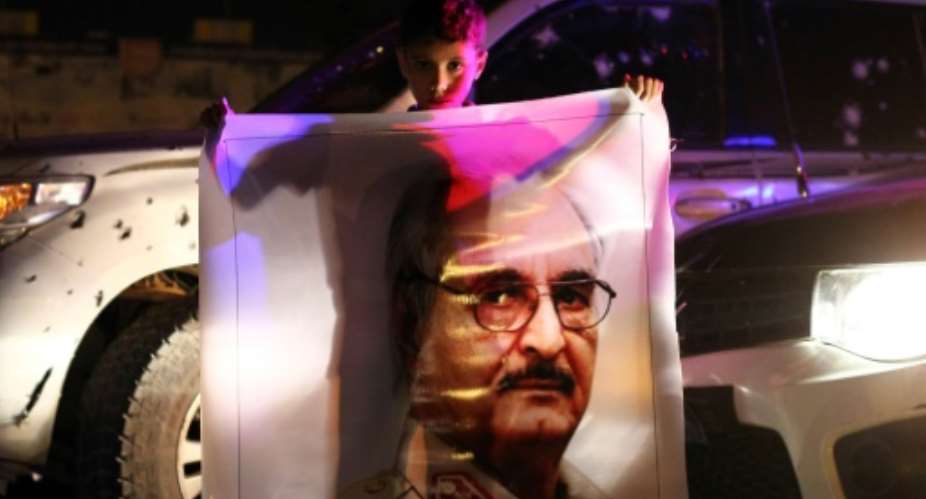Tripoli (AFP) - General Khalifa Haftar, whose forces have seized three vital Libyan oil terminals, is a controversial military strongman who has refused to bow to a UN-backed unity government.
Haftar, 73, presents himself as Libya's saviour in the face of a growing jihadist threat, but is himself a hugely divisive figure.
He enjoys the support of lawmakers in the internationally recognised parliament in the country's far east, but is opposed by the UN-backed and Tripoli-based Government of National Accord (GNA) and has refused to recognise its legitimacy.
Haftar's relations with the authorities in Libya have always been complex.
In 1969, he took part in a coup that overthrew the monarchy and brought dictator Moamer Kadhafi to power.
Haftar served under Kadhafi but later fell from grace when he was captured by Chadian troops during Libya's fruitless 1978-1987 conflict with its neighbour.
Tripoli denied Haftar was part of the Libyan army, and he languished in jail until the United States managed to secure his release and offer him political asylum.
In 2011, he returned home after more than two decades living in the United States where it was rumoured that he worked for the CIA, to take part in the NATO-backed uprising that toppled and killed Kadhafi.
Three years after the revolution, Haftar declared war on jihadists in second city Benghazi, prompting Libya's then-government to accuse him of trying to stage a coup.
But after Islamists seized Tripoli soon afterwards, forcing parliament to flee to the country's far east, the recognised authorities gradually allied themselves with a figure previously seen as a power-hungry renegade.
In March 2015, Haftar was named head of the Libyan army loyal to the internationally recognised parliament which has steadfastly refused to recognise the GNA's legitimacy.
Self-styled commander
The appointment aimed to "legitimise" Haftar, a year after the general and self-styled commander of the Libyan National Army waged "Operation Dignity" against Islamists in Benghazi.
Since the campaign was launched in May 2014, forces of the white-haired general with contrasting black moustache have pushed most of the jihadists from the city.
They also announced plans to fight the Islamic State group in Sirte, but kept aside as forces loyal to the GNA in May this year began an offensive against the Muslim extremists in Kadhafi's home town.
With the loyalists weakened by a more than three-month offensive against IS, Haftar's forces at the weekend fought pro-GNA oil guards for control of oil terminals west of Benghazi.
 This file photo taken on January 8, 2016 shows smoke billowing from a petroleum storage tank after a fire was extinguished following fighting at Al-Sidra oil terminal, which is one of three oil terminal seized by Khalifa Haftar's forces
This file photo taken on January 8, 2016 shows smoke billowing from a petroleum storage tank after a fire was extinguished following fighting at Al-Sidra oil terminal, which is one of three oil terminal seized by Khalifa Haftar's forces
By Monday they were in control of Al-Sidra, Ras Lanuf and Zuwaytina terminals.
The unity government called on all forces loyal to it to "protect and defend" the ports against what it called "flagrant aggression" against Libyan sovereignty.
Oil is Libya's main natural resource with reserves estimated at 48 billion barrels, the largest in Africa.
The GNA was hoping to use revenues from oil exports to rebuild the country's economy which has been devastated by five years of conflict.
It was the first time that Haftar's forces and fighters loyal to the GNA have clashed directly since the unity government started working in the capital in March.
Analysts warned that it may not be the last and the two could clash again.
In a 2015 interview with AFP, Haftar insisted the military had no interest in meddling in politics, describing it as the "protector against anyone trying to disrupt the democratic process by force".





 Whoever participated in the plunder of the state must be held accountable – Jane...
Whoever participated in the plunder of the state must be held accountable – Jane...
 A vote for John and Jane is a vote to pull Ghana from the precipice of destructi...
A vote for John and Jane is a vote to pull Ghana from the precipice of destructi...
 I’ll repay your abiding confidence with loyalty, understanding and a devotion to...
I’ll repay your abiding confidence with loyalty, understanding and a devotion to...
 ‘I’ve learnt deeply useful lessons for the future' — Serwaa Amihere breaks silen...
‘I’ve learnt deeply useful lessons for the future' — Serwaa Amihere breaks silen...
 I’m sorry for the embarrassment – Serwaa Amihere apologises for leaked sex video
I’m sorry for the embarrassment – Serwaa Amihere apologises for leaked sex video
 Dumsor: Matthew Opoku Prempeh not in charge of Energy sector – Minority
Dumsor: Matthew Opoku Prempeh not in charge of Energy sector – Minority
 Adu Boahen’s murder: Police arrest house help who was in possession of deceased’...
Adu Boahen’s murder: Police arrest house help who was in possession of deceased’...
 Akufo-Addo nominates Felicia Attipoe as Tema West MCE
Akufo-Addo nominates Felicia Attipoe as Tema West MCE
 Election 2024: I can't have someone I defeated twice as my successor – Akufo-Add...
Election 2024: I can't have someone I defeated twice as my successor – Akufo-Add...
